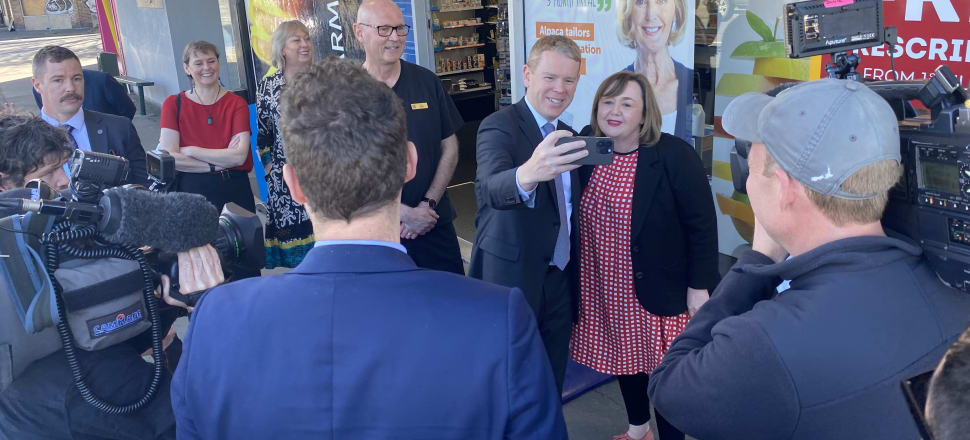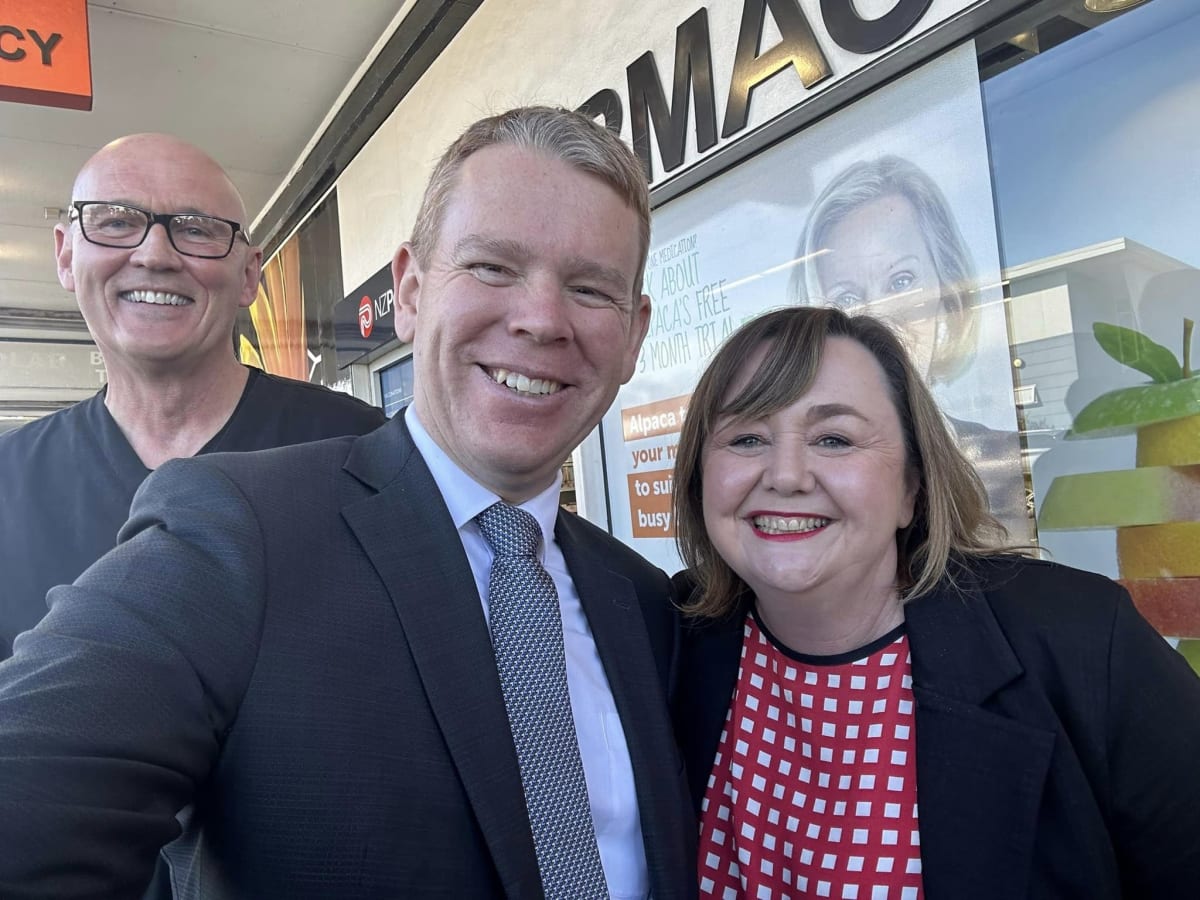
Chris Hipkins doesn’t get it all his own way in a deep-red seat
It’s a reasonably non-descript block of shops in southern Christchurch.
A fish and chip shop, of course, a dairy, bakery, bottle store, and pub. There’s also a pharmacy, medical centre, and an occupational health clinic.
Look more closely at this cluster of businesses in Sydenham, and you’ll find a few shops are closed – a veggie shop, and an old blood test centre. An Afghan restaurant has been replaced with another food outlet, selling “souvlaki and island food”.
Some remaining businesses are struggling.
READ MORE: * State of the economy in the eye of the beholder * The latest charts and data on Election 2023
Sue, who owns a pre-loved boutique store, Style Me, says sales were sailing along OK until the past two or three months.
Shouldn’t second-hand shops be doing better?
“But people just don’t have any money for anything,” Sue says. “Once they’ve bought the food and put petrol in the car, and all those sorts of things, they have no spare cash.”
Her shop tries to keep prices reasonable but, she says with a sigh: “Ooh, it’s getting hard.”

Pies & Coffee bakery co-owner Sarah Lim, who’s originally from Cambodia, has also noticed a downturn, with some of her regular customers have become irregular.
She and her husband are drawing only one wage to keep the business going. “I try my best to keep my prices as low as I can, but I can’t do it.”
(For the record, a standard pie sells for $7.)
Business owners aren’t always rich, Lim says. The bakery might make money today but be quiet for the rest of the month. It still has to cover its costs.
“We pay a lot for GST, we pay to IRD, but the Government doesn’t understand when we’re quiet, when it’s not busy, how much we’re struggling.”
This is the block Prime Minister Chris Hipkins chose to visit yesterday morning, visiting the local pharmacy to celebrate Labour’s policy of scrapping the $5 co-payment for prescriptions.
Korrina Kenny came to collect a prescription. Outside the pharmacy, she says previously she had been struggling to pay her medical bills.
“I’m on the bones of my arse,” she says, with a laugh. “Basically I had to cut my medication down.”
Before Hipkins heads into the central city, Wigram MP Megan Woods ushers him down Selwyn St, explaining this is the spiritual home of her electorate as it used to house the office of Jim Anderton.
(Anderton, who died in 2018, first won the seat of Sydenham in 1984, and, when the seat was re-jigged and re-named Wigram in 1996, was MP until 2011. He famously split with Labour over its free-market reforms, and went on to lead the Alliance and the Progressive Party.)
The security detail isn’t keen on the prime minister walking down the street, however, where onlookers, outside the pub, observe the media scrum.
Woods gets her selfie outside the pharmacy, instead, and Hipkins is whisked away.

Outside the Celtic Arms, Newsroom catches up with Richard, who’s from nearby Hoon Hay and looking forward to having a drink with his friends.
If the prime minister had wandered down the street, Richard reckons he would have shaken his hand and said hello. “I haven’t got too much of a say, really. I’ve only been in the country a few years,” he says, with an Aussie twang.
It turns out Richard’s spent 32 years in Australia, but was deported. “I love New Zealand,” he declares. “I was born here but to come back and get welcomed back home and made to feel like I’d never left is awesome.”
What would he want from politicians this election? “They’d let me go back home,” he says, referring to Australia, where his kids and parents are. “I’ve got no family here.”
"Everyone’s pulling their belts in but there’s only so much you can do.” – Sue, Style Me boutique
Richard says he’ll vote Labour – “I just don’t want to see National get in”.
Lisa, who soon pops into the pub with Richard, reckons she’ll vote the same way. “I don’t have a high enough income to vote National.”
Next door to the pub, bottle shop owner Amar Singh mentions security and shoplifting as major issues. In the next breath, however, he says crime in the area is “pretty good” – meaning low. The shop hasn’t been ramraided.
Asked about his voting preferences, Singh singles out Act leader David Seymour as offering realistic policies. “But I haven’t decided that yet.”

Another business owner, who doesn’t want to be named, says the economy and health are two major issues. On the latter, they say the Government appears to be focusing on secondary health, “in fact, primary health [referring to GPs, pharmacies, and the like] is what keeps people out of hospital”.
They’re struggling to provide a quality service at a reasonable price, for a variety of reasons, including post-Covid struggles with finding and retaining staff.
National will get their vote – “I think we just need some steady hands”.
At the pre-loved boutique, the Hall & Oates song Maneater plays over the radio.
The owner, Sue, says the Government needs to try and reduce petrol and food prices somehow.
“I know it’s a very easy thing to say, but it has to start somewhere. Everyone’s pulling their belts in but there’s only so much you can do.”
(Labour has vowed to take GST off fruit and vegetables, while National has promised tax cuts. Taxes on fuel help pay for transport projects. Higher prices can deter some people from using fossil fuel-powered cars, and, therefore, lower greenhouse gas emissions, but other people who rely on those vehicles for work are forced to pay more.)
Sue’s a swing voter who hasn’t decided who to vote for.
But she admits: “I’m a little bit scared of the other side [the National bloc of parties] that keep promising all this ... I just don’t know how they’re going to deliver.”

Back at the bakery, Sarah Lim says she’ll vote National. Her impression is Labour seems to be more interested in giving money to people who are “not trying or willing to work hard”.
Beyond the cost of living, Lim throws a curveball about a more general concern.
She gave birth six weeks ago and, four hours later, with her body still shaking from the experience, was told to go home.
(There are fewer maternity beds in the city with the closure of a unit at St George’s hospital.)
Cambodia might be a poor country but it doesn’t send women straight home after giving birth, she says.
This block of shops in a Labour stronghold might be book-ended by the party’s billboards, but it’ll take more than a visit by the prime minister to convince some business owners to vote red in this election.








